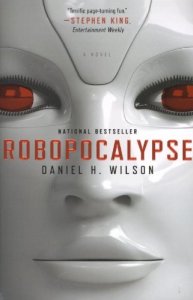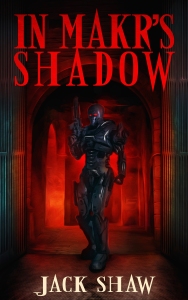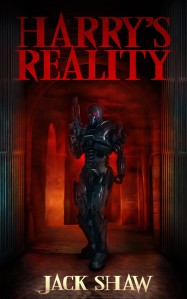Scene note: Kieran O’Shea is blind from an earlier incident and is being led home by Carlos’ senior sergeant. Don’t forget to look at my past few blogs for a coupon code allowing you to download a free digital (any format) copy of Harry’s Reality. Imagine hearing this scene rather than watching a video slide show promoting my novel. Which do you think would be more effective?
“Don’t pull me so hard, Harlan!” She struggled and pulled her arm free. “I can walk. Talk to me,” she ordered. “I’m not a child.”
“So you aren’t.” There was always something unsettling about that voice. Sergeant Harlan Leach was a scumbag, but he was also a ruthless survivor. After all, he had so far effectively evaded the cybert forces after the accident even with the loss of some of her Stealth garments. He was still a loathsome human being. He expected all others to bow to his self-serving, cold-hearted authority. It was time and experience that had made him Carlos’ chief sergeant, not strength of character. Hard times require hard people, and he was a good soldier when it counted.
Harlan hooked his arm gently around hers and guided her. Maybe he’s not so bad after all? Or so she thought until she felt the fabric of her cloak moving away from her skin as if picked up by the wind… There is no wind! Then a touch of her breast! Then she felt his touch lower and lower! She recoiled, tearing away from his grasp.
“Damn you! Damn you, Harlan! Haven’t you an ounce of decency?”
“What for? We live like rats. Might as well act like ’em.”
“You know why.”
“The Nests protects us,” he sneered.
“We’re all in this together.”
Now she is beginning to sound like Carlos.
“So what!” He was in her face. She felt his stinky hot breath when he opened his mouth. “I don’t need anyone. I can take care of myself…”
“I’m sure you can, Harlan.”
“…and I take what I want.” His tone was rough, edgy and menacing.
Sensing that he was reaching for her again, she swung her right arm back and forth wildly, hoping to keep him at bay, but she missed him palm forward, and struck him with her harder back-handed return—on the face, she guessed.
“Ow,” he squealed. “What’d ya go and do that fer?”
“Some of us aren’t ready to join the rats yet.” She hoped she was reading him right but he backed down too easily.
“Sorry.” He almost sounded genuine. Almost.
“What is it you really want, Leach?”
“Nuttin’. Just wanted a feel, tha’s all.” He sniffed. A cold? Bloody nose, more likely? The thought of that made her smile—which was not at all what he wanted from her.
She laughed hysterically as one can in Stealth gear —it was more like the body shaking really.
“Did you run out of cybersex toys? I’m surprised at you, Harlan. Taking advantage of a blind woman. You stupid bastard! Open my Stealth cloak for a peak and we’re both more exposed. Is that what you want?”
Silence.
“No answer, Harlan? Is it because you know I’m right?” Still silence. Has he left her? “I know you’re here, Leach. I can still smell you.”
I can just leave ya here, Bitch, he thought, standing belligerently a few feet away. Let the Cleaners get ya! Not exactly the kind of action you’d like, I’m sure. You got Carlos in your dreams, Honey?
While her depraved companion kept his thoughts to himself, Kieran was becoming increasingly uncomfortable with his silence.
“What no words, Leach? C’mon deal with me. Not thinking about leaving me here, are you?”
Who’s bluffing now? She was worried he might do just that—abandon her. She wouldn’t survive for long without the others. Maybe that’s best. Stop thinking like that, Kieran, she told herself.
“Getting you home safe—what’s in it for me?” He reached for her again. She thought she smelled and felt his presence but she heard his cold voice and could tell it was safely distant. Maybe he was planning to leave me to the Cyber street cleaners after all.
“What’s in it for you?” she responded incredulously, a whispered shout. “Your life, Asshole!” Then she spread it on thick. “If I don’t show up, guess who gets blamed! Not me, Sugar. You better find yourself another Nest.”
If I could just see your face, right now… Damn you!
“You know Carlos is just waiting for an excuse, don’t you?” she taunted. “Or are you dumb enough after all to be unaware that Carlos merely tolerates your presence while he is disgusted with you?”
Leach was aware, and knew his own survival to be more important than sex. He muttered something unintelligible.
“All right, damn it!” He touched her arm, which made her jerk it away. “I said I’m sorry. Now, let’s go.”
Pausing for a second to assess the situation, she moved her arm back and allowed him to get hold of her sleeve. He led her by clutching and tugging on the fabric in such a way that he would not even pinch her skin.
“Yes, Sergeant,” she saluted mockingly.
Leach dismissed her tone and escorted her at a safe distance, mindful not to touch any other body part but her arm. Damn bitch won this time, he thought. In fact, he practically forgot the incident with Kieran O’Shea even as he and she zigzagged silently through the Shadows back to the Nest. In his estimation, she was only a slut not worth giving a second thought.
However, what she had said about Carlos was true enough. They hated each other with a passion. Leach had hated Carlos for a long time. Through the fabric of his Stealth cloak, he ran a finger along the scar on his face where a Bio eye should be—a constant reminder of his hatred. He moved his fingers to the stainless steel socket that held a mechanical eye. There had been no cloned eye for him—too much damage to the bone structure, nerves and tendons. He had had to have an artificial, cybernetic one after the Bio docs Outside tried unsuccessfully to graft bone from his hip because the eye socket from his clone had not worked either. Too much damage to the facial structure and optical nerve they had said. His mechanical eye had its own pathway to his brain.
In the end, he went back Inside to a Cyber surgeon that, even with its perfect skills, could only make him part hated machine and part hideous human “to keep him operational.” For Leach, saying the operation was a success but the patient had died, was not just cliché. He was worse than dead; he was nothing. The machines did not even seem to notice when he got up and left to walk back Outside. He was an irrelevant Bio worth a quick repair to keep him pacified. Not even worth deleting.
I could have been a real leader but who’d pay attention to me with these hideous, raw scars and exposed metal-marked face? I look too much like the enemy.
I have always planned to do an audiobook as well as a traditional print copy of Harry’s Reality, but not self-printed. I have a good excuse for no audiobook. No studio. I may do some audio clips and post them on this site; I may even leave the background noise in and see how it does. However, I do think good audio clips can be just as effective as an art presentation turned into a video. Isn’t it really little more than moving pictures and information.
Early on I tried to publish Harry’s Reality traditionally, but at that time it wasn’t ready. It hadn’t been professionally edited, but I went through three agents who thought it worthwhile and received positive feedback from publishers, but no offers. I did, however, receive a handwritten letter from one publisher that encouraged me to re-write Makr as it was titled then to become what it is now: Harry’s Reality.
The question is always: if it is so good, why did you publish it as an e-novel instead of using traditional publishing? Impatience. Time. Wanting to move on. Wanting to test the new medium for writers and see if it was as some claimed–a better way to go for some writers. Harry’s Reality was written off and on over a long stretch of time and has gone through many gyrations. It has even been in present tense. I liked it. No one else seemed to–do it’d not in present tense. I was tired. E-books finally made sense.
I have heard others talk about why they write e-books, and this is what they say: “my subject matter has a limited audience,” or “the publishers have a handful of bestsellers and won’t publish new writers,” or “I don’t want to mess with all the prep work to get it to the publisher and the waiting.” The best one is “you have to be a celebrity to be noticed.” True. Whatever sells books. We, e-book or self-published hard copy writers, have to go door-to-door using the social media electronically so to speak. The fact is our e-books or self-published books still have a stigma attached as poorly written or researched, and most people like paper. I still like my novel. I aim to make it paper, too, but not on my dime.
One thing I do know. I will do some audio clips of Harry’s Reality. Tell me what you think.
My next book won’t take as long as Harry’s Reality to write and will require more research. More on that one later. I may start out trying to publish it traditionally. Who knows what the market will be like then? Right now, it’s a mess.
39.898696
-75.028515








